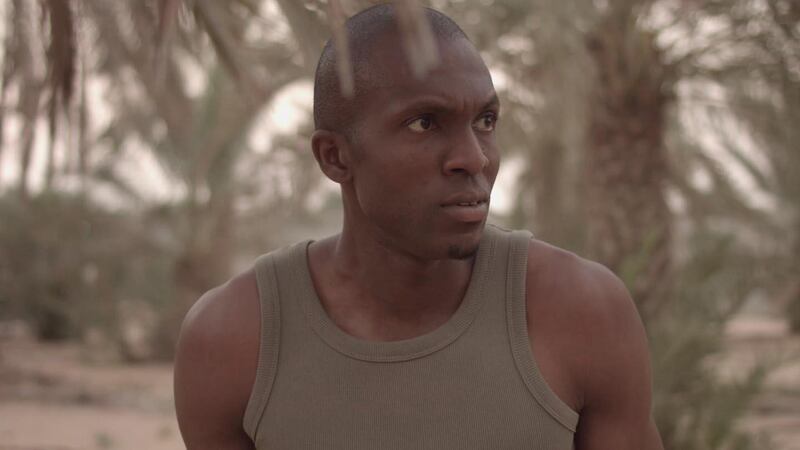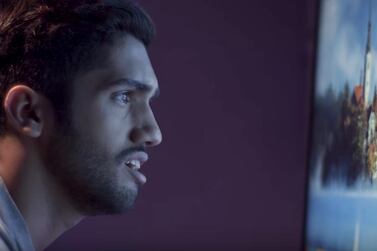Emirati cinema could be about to get its first "Cinematic Universe" thanks to local director Tariq Alkazim. The director is returning to the wheelhouse of his 2017 horror A Tale of Shadows to begin shooting a sequel, A Tale of Shadows: Illusions, next month.
Alkazim is currently one of the most prolific directors working in the local industry. Following A Tale of Shadows' cinema release in 2017, he returned with a new film Until Midnight in 2018, and with Illusions set to be released in early 2020, Alkazim finds himself in the rare position of a local director who has successfully issued a film on general UAE cinema release roughly once a year for the past three years.
Although last year's Until Midnight was unrelated to A Tale of Shadows, Alkazim says a sequel was always on the cards when the time was right. In fact, he says about eight films could follow A Tale of Shadows, bringing the series total to nine, creating UAE cinemas' first Cinematic Universe. "I actually have around nine stories currently in the Tale of Shadows universe," he says. "It's not going to be quite like Marvel. My films will be linear and follow the story chronologically, but with a lot of the same characters and the same central story.
"Three characters from the previous film are returning, which is basically all of the lead cast."
What's in store for the sequel
Among those is actor Chuka Ekweogwu, who has starred in both of Alkazim's previous films, perhaps setting the scene for a localised version of the Tim Burton / Johnny Depp working partnership. Also returning to this new movie is the creepy farm location between Al Ain and Dubai where the previous film was set, "although this time we will also be shooting a section of the film in Dubai," says Alkazim.
"The farm is a really dynamic location. It's huge, and different areas have really diverse, different looks, and most important is that it's freaky scary there. We may not shoot all nine future films there, but it will certainly play a big role going forward."
Alkazim's latest film is currently in pre-production, with a $2 million (Dh7.3m) budget in place through private investors, and the intriguing prospect of "a couple of big names, one local, one international" still hopefully to be cast. The shoot is scheduled to begin on April 1.
How to survive the local industry
With the past few years in the local industry having been dominated by the closure of film funds and festivals such as the Sanad Fund, and both the Abu Dhabi and Dubai Film Festivals (although Dubai may yet return in a different form), I ask Alkazim how he has managed to keep raising money and releasing films so prolifically when many of his contemporaries have been notably quiet recently. "It's tough here," he concedes. "We still don't have a full industry, but if you have something and can convince funders it's something great, if you can convince investors and they believe in the project, then they will fund it."
Alkazim adds that he may have an advantage over some of his peers due to the fact that he dedicates his entire life to his films: “Me, I only focus on filmmaking,” he says. “A lot of the other directors, they have commercial films they do, they have side jobs, it takes away from the time they have to make movies, whereas that’s all I do. I’m a full-on filmmaker.
"I've always got multiple things on the go. Even when I start on a new project I'm already working on the next one. For example, when I was shooting Until Midnight, I was already working on Illusions, too. That's how I manage to have a film in cinemas every year."
Why the closing of local film festivals could be a good thing
In fact, Alkazim adds that, although he is sad to see the end of so many local festivals and film funds, the end result could be positive for the local industry as it removes, essentially, a safety net for poor, or commercially unviable, films. "With the festivals all running away, Emirati films will have to look to going through cinemas, promoting themselves online and so on," he says. "If DIFF returns every two years, I see that as both a good thing and a bad thing. If it's only every two years it'll be more 'wanted'.
“Everyone will want to attend and be part of it. But equally there will be fewer opportunities for filmmakers, because they’ll have to wait two years to show their films, so I think that will push people more towards cinemas.”
That, in turn, Alkazim says, will force filmmakers to think more carefully about the kinds of movies they are making, hopefully advancing the industry in the process. "I think it pushes filmmakers to be part of the commercial cinema world, and that's a good thing because they'll realise the benefits of commercially releasing a movie," he says.
"The downside will come with people who want to make dramas, which aren't big commercially, but which are more of a fit for festivals. But for comedy, thriller, horror, I think it could result in many more commercial releases, and ultimately a stronger industry."






